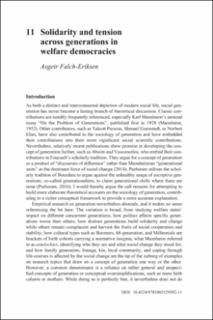| dc.description.abstract | In this chapter, social generation will be applied as a normative-political and sociological concept in combination, and that can be used to explain social order and the development of a political order through democratic self-government. Hence, each social generation is not only partaking in their own lives but also participating according to a civic republican ethos in collective decision-making and coordination. Through this effort, each generation also becomes authors of legislation, regulation, and administrative implementation of welfare state policies and programs. The generation concept will be presented as able to explain the prevalence of social order and the political-legal order of a welfare state and how welfare programs and policies are transferred across generations with seemingly slow-moving changes. The chapter will first elaborate on the context provided by modernity. Second, we lay out the motivation for establishing order. Third, we draw on the motivational force to establishing order and explain how social order is also a normative expression of solidarity. Fourth, we elaborate on how a concept of solidarity becomes transformed through democratic law-making to a welfare state, and how we must speak of social solidarity as embedded in a fluctuating social order, and a version of it stabilized in the welfare state as political solidarity. Fifth and last, we introduce tensions and change within order and how that shapes and reshapes solidarity. | en_US |

